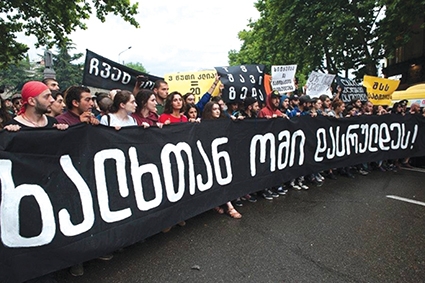Thousands Rally in Tbilisi against Arrest of Rapper Duo
On June 10, several thousand people demonstrated on Rustaveli Avenue in front of the old Parliament building in reaction to the arrest of Mikheil Mgaloblishvili and Giorgi Keburia, together a rapper duo called Birja Mafia. They are charged with possession of a large quantity of drugs and face up to lifetime imprisonment. According to the Ministry of Internal Affairs, they were arrested with doses of 1.5 and 2.3 grams of MDMA each, a synthetic drug also known as Ecstasy. The Ministry also claims that Keburia pleaded guilty of this accusation. However, the official account is challenged by the two arrested men.
In March, the band released a video on YouTube depicting a policeman as a dog, which was quickly removed from the platform at the request of police authorities. But on June 4, a new version was published with the policeman blurred. The band claims it is this video that motivated the police to arrest them. Mgaloblishivili claimed during the court hearing that policemen during his arrest said it was to teach him “a lesson”. Such practices remind one of the Soviet era, when the tough policy on drugs could be used to blackmail or to make someone “disappear”. Still, modern Georgia sees the strict drug policy often used as a means to control people and allows the police to abuse its power, activists claim.
The drug policy in Georgia has improved but is still very repressive, according to various human rights groups, who give as an example the urine tests that the police can force people to do at any time in order to verify drug use, and the long terms of imprisonment for people found carrying drugs, regardless of quantity and type.
This recent event seems to have obliged officials to deeply shift their position on the question. Without saying that the two rappers are innocent, Education Minister Aleksandre Jejelava announced that “they should be held accountable” if they are convicted, while Prime Minister Giorgi Kvirikashvili recognized in an unprecedented statement that the Georgian drug policy is “excessively harsh and requires liberalization” and says he is in favor of an acceleration of the parliamentary work on this specific question with the aim of “adopting a law” in line with European standards “at least by the autumn session”. Energy Minister Kakha Kaladze also reacted by supporting the police institution but adding that the current drug policy and police practices need “radical changes”.
The success of the Sunday protest also highlights its organizers, a group called the “White Noise Movement” formed against “inhuman drug policies” which is relatively small-scale but yet proved it was able to strongly mobilize outside its activist core. It also showed that drug policies activism, which is not the most mobilizing cause, could be easily related to other democratic issues such as free speech in this specific case, in order to create a larger social movement.
David Mongazon
Photo: Protesters support detained 'Birja Mafia' members on Rustaveli Ave. Source: Erika Copeland Facebook












